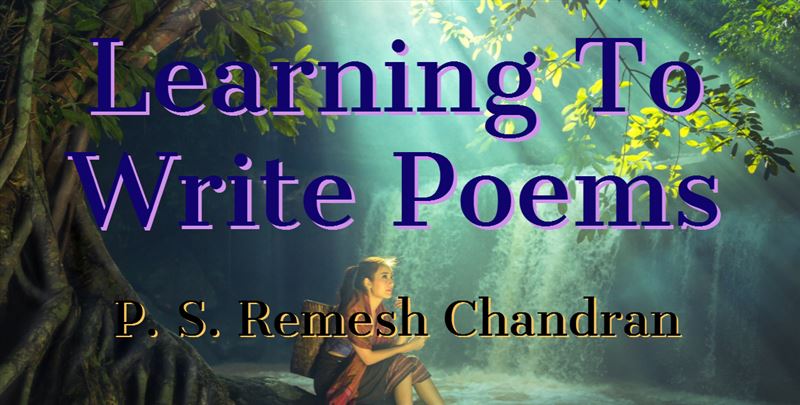
Poems are made of human thoughts. They are the spontaneous, natural outflow of emotions evolving from close and objective observations of the things and circumstances around us. Since human mind carries a bit of cosmic world inborn in it, it cannot prevent itself from rising to elations at the revelation of truth at moments of discovery. How to create and write poems has been an eternal question, the answers to which occupy a considerable portion and major status in philosophic literature.
Where did all the poems voiced into the jungle, mountain, sea shore, wind and running stream go?
As soon as dialect and alphabet were invented, the first poem was written. Writing poems was one of the earliest engagements of the human mind, second only to painting. Since the earliest poems were written on leaves and tree barks, they unfortunately did not survive. At least worms went through them and avian beauties sat on them. Those which were fortunate enough to be written on papyrus rolls, cave walls and rock faces survived, constantly reminding us of the naturality and delicateness from which our literature has fallen. And those which were simply voiced into the jungle, mountain, sea shore, wind and running stream never came back, but were taken to the higher realms of Ether.
Children three to five are born singers and song-makers, gifted by Nature and the Universe.
One who sings songs can easily learn to write poems. It helps mastering the technique of arranging sounds as words in a poem. Singing as many songs as one can will create an appetite, voraciousness and lust for creating more songs our own way. It is true that if we observe children at their ages from three years to five, they can be found to be making up their own songs and singing them to themselves melodiously. All of us have done it at that age. That is a gift from Nature and the Universe to those who are come new to this world. We will wonder whether singing would be the main pastime in the Creator's land. As we become conscious of ourselves and more and more haughty and capricious in the course of our lives, this godly faculty fades away, leaving us alone in the middle of a desert of selfishness.
How does the Goddess of all Learning, Knowledge, Poetry and Music sit on a Lotus Flower that does not submerge?
Poetry is a benediction of the Muses. To make it possible, the writer should be simple in mind and consider him as a nonentity. In the Hindu philosophy, the goddess of learning and music, Saraswathi Devi, is seen sitting on a lotus flower in the water, holding the musical instrument Veena. A frequently asked question is, in spite of the weight of her learning, why does not the lotus submerge. Philosophy explains that She is simple, and so her learning has not at all any weight. Therefore the first step to learn to write poems is to shed all pride, haughtiness and capriciousness from our person, and to sing as many songs as possible. Whoever sings will feel the breath of God on his back. It is said that He is standing just behind the persons who are singing. That is why they are singing.
Reattain the lost innocence, allow children to sleep in your rooms and see their sleeping night face. It is once in a life time.
The next prerequisite to learn to write poems is to reattain the once-lost innocence. Remember that tiny little infant making songs for herself and singing all by herself. Without offending anyone, it may here be said that such tender and ardent scenes from human life can be observed and modelled upon only in communities where children are slept with parents in their room instead of in a separate baby room, and the infants are looked after by their own mothers and not by ayahs, nurses or caretakers. Anyway, imitating those infants in instant song- making is a giant step towards learning to create poetry.
A tiny stone can close the origin of a mighty stream, and the removal of one can cause the bursting out of an eternal stream.
Thus when the ground is set, one can begin to read as many poems as one can from the world literature. Reading the epics and classics in literature has created more poets than all the Universities and classrooms in this world combined have done. Reading of epics and classics gets us acquainted with whatever a writer of poems needs to know. Once these ground preparations are completed, one cannot help writing poems. It will come spontaneously, bursting out from the depth of the childhood innocence that is in every man. Just as a tiny stone can come rolling down and close the mouth of a stream, the removal also of a tiny stone can cause the outburst and flow of an eternal stream. Thus it is a pleasure learning to write poems. And once it is learnt, it is a source of delight to the entire world.